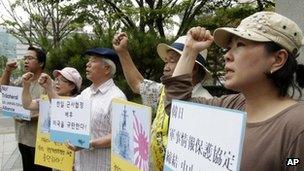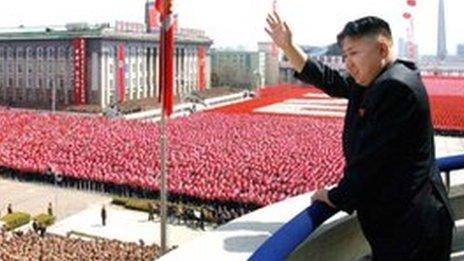South Korea postpones historic military pact with Japan
- Published

The military pact with Japan has sparked protests in South Korea
The South Korean government has abruptly postponed signing a military intelligence agreement with Japan in response to anti-Japanese sentiment.
It made the announcement less than an hour before the two sides were to sign their first military pact since Japanese imperial rule ended in 1945.
There have been protests in South Korea over the pact to share intelligence.
The country's ruling party said more consultation was needed and it was wrong to rush the agreement.
The agreement would have facilitated sharing of information on regional defence issues, especially on North Korea's missile and nuclear programmes, and also on China.
South Korea had approved the pact early this week, while Japan approved it on Friday.
But South Korea decided to cancel the formal signing ceremony, saying it would hold further consultations before proceeding.
"It's a South Korean internal matter," Japan's Chief Cabinet Secretary Osamu Fujimura said during a news conference.
"It's been delayed, even though we had expected to sign it today, so it's unfortunate."
'Pardon'
Both Japan and South Korea are close military allies of the United States, and both are alarmed by the military threat from North Korea and apprehensive at the growing strength of China.
The agreement would enable both sides to benefit from Japan's high-tech surveillance capabilities and South Korea's human intelligence on the North.
But suspicion and hostility dating from the years of Japanese colonial rule continues to inhibit closer co-operation, the BBC's Charles Scanlon says.
The US has urged its Asian allies to work together to match the growing might of China in the Pacific.
But nationalist critics in Seoul accused the government of covertly rushing through the agreement without adequate consultation.
They say the pact could be seen as a de facto pardon for Japan's atrocities during its colonial occupation of the Korean peninsula.
The South Korean government says it still wants to sign the agreement - after consultations with the National Assembly.
But in an election year, conservative politicians will be sensitive to charges that they are selling out to the old enemy, our correspondent says.
- Published25 April 2012
- Published3 September 2017

- Published20 January 2011